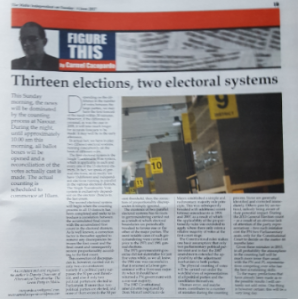Il-pjani lokali huma 7. Il-Pjan Lokali dwar il-Bajja ta’ Marsaxlokk kien approvat fl-1995, madwar sentejn wara li twaqqfet l-Awtorità tal-Ippjanar. Kellhom jgħaddu 7 snin oħra biex ġie approvat pjan lokali ieħor, din id-darba dak għall-Port il-Kbir. Il-bqija kienu approvati f’daqqa bl-għaġġla fis-sajf tal-2006. Fl-2006 ukoll kien ippubblikat u approvat mill-Parlament dokument ieħor dwar ċaqlieq tal-linja tal-iżvilupp, intitolat “Rationalisation of Development Zone Boundaries”.
Kull wieħed minn dawn it-tmien dokumenti huwa wild il-PN fil-Gvern. Il-konsiderazzjonijiet ambjentali fihom huma nieqsa bil-kbira.
B’mod partikulari, d-dokument li ċaqlaq il-linja tal-żvilupp ġie approvat mill-Parlament b’għaġġla kbira u bħala riżultat ta’ hekk żewġ miljun metru kwadru ta’ art li kienu barra miż-żona ta’ żvilupp (ODZ) f’daqqa waħda saru tajbin għall-iżvilupp.
Mill-Opposiżżjoni l-Partit Laburista fil-Parlament ivvota kontra dan iċ-ċaqlieq tal-linja tal-iżvilupp, imma, wara, meta tela’ fil-Gvern ġie jaqa’ u jqum minn dan kollu. Dan minħabba li l-opposizzjoni għall-proposti kienet waħda partiġjana mhux minħabba xi viżjoni alternattiva.
Il-pjani lokali jeħtieġu reviżjoni immedjata. Id-dokument li jistabilixxi kif kellha tiċċaqlaq il-linja tal-iżvilupp għandu jitħassar u safejn hu possibli dik l-art kollha (ż-żewġ miljun metru kwadru) terġa’ issir art ODZ – barra miż-żona tal-iżvilupp.
Fost it-tibdil meħtieġ hemm tnaqqis ġenerali fl-għoli permissibli tal-bini, liema għoli, f’ħafna każi qed itellef lill-komunità residenzjali mid-dritt ta’ aċċess għax-xemx. Dan qed inaqqas u jostakola l-potenzjal tagħna bħala pajjiż fil-ġenerazzjoni ta’ enerġija rinovabbli. Dan kollu kien injorat mill-pjani lokali.
Hemm bosta materji oħra fl-erba’ rkejjen tal-pajjiż li jeħtieġu li jkunu eżaminati mill-ġdid. Kif spjegajt f’artiklu preċedenti l-pjani lokali ma jagħtux każ tal-impatti kumulattivi tal-iżvilupp li huma stess jipproponu. Din hi materja bażika li teħtieġ attenzjoni kbira għax għandha impatt sostanzjali fuq il-kwalità tal-ħajja tagħna. Sfortunatament il-pjani lokali ftit li xejn jagħtu każ tal-kwalità tal-ħajja. Jiffokaw fuq is-sodisfazzjon tar-rgħiba.
Għandu jkun hemm kumpens jekk art li illum tista’ tkun żviluppata terġa’ lura fl-ODZ bħala art mhiex tajba għall-iżvilupp?
Xi ġimgħat ilu l-Ministru Aaron Farrugia responsabbli għall-Ippjanar u l-Ambjent kien qal li kellu l-parir favur id-dritt ta’ kumpens. Konvenjentement l-Onorevoli Ministru injora l-fatt li l-Qorti Kostituzzjonali f’Malta kif ukoll il-Qorti Ewropeja dwar id-Drittijiet tal-Bniedem diġa kellhom kaz bħal dan fejn kien hemm talba għal kumpens. Il-Qorti Kostituzzjonali irrifjutat it-talba u l-Qorti fi Strasbourg ma ikkunsidratx t-talba f’deċiżjoni fis- 27 September 2011 li fiha iddiskutiet il-parametri legali applikabbli.
Il-kaz huwa dwar il-kumpanija Maltija Trimeg Limited u jikkonċerna 10,891 metru kwadru ta’ art li kienu fil-limiti tal-iżvilupp fl-1989 kif stabilit mill-iskemi temporanji tal-iżvilupp ta’ dakinnhar. Imma fl-1996 din l-art ġiet skedata għal skop ta’ konservazzjoni f’kuntest tal-protezzjoni tal-widien. Fil-Qrati Maltin il-kumpanija Maltija kienet qalet illi li kieku ħarġu l-permessi ta’ żvilupp l-art kien ikollha valur ta’ €11-il miljun. B’daqqa ta’ pinna imma, dan naqas għal €230,000. Trimeg Limited kienet xtrat din l-art €140,000.Il-Qorti Kostituzzjonali f’Malta ma aċċettatx dawn l-argumenti. Il-Qorti fi Strasbourg ma bidlet xejn minn dak li qalet il-Qorti Maltija.
Dan hu kaz wieħed biss. Il-ħsieb ġenerali iżda hu li apprezzament tal-ħarsien ambjentali qed jaqbad art fost in-nies illum li huma iktar sensittivi minn qatt qabel dwar dan. Ħadd m’għandu jistenna kumpens għat-tibdil li jkun meħtieġ.
Din hi ġlieda kontinwa mar-rgħiba u l-ispekulazzjoni. Nafu li fil-passat, u għal żmien twil, ir-rgħiba kienet minn fuq. Ir-rgħiba fl-ippjanar għall-użu tal-art kellha żewġ parrini: il-PN u l-PL. Fl-Opposizzjoni jopponu u fil-Gvern jirrumblaw minn fuq kulħadd.
Kemm il-PN kif ukoll il-PL ma jistgħux jindirizzaw din il-mandra fl-ippjanar għall-użu tal-art għax huma parti mill-problema: il-PLPN ħolquha, kabbruha u iddefendewha. Il-PN beda l-froġa u il-Labour sostniha.
Hu meħtieġ li nibdew paġna ġdida. Il-linja tal-iżvilupp trid titraġġa lura u l-pjani lokali jeħtieġu tibdil mill-qiegħ. Aħna l-Ħodor biss nistgħu nagħmluh dan, għax aħna m’aħna fil-but ta’ ħadd. L-oħrajn, bil-provi wrew tul is-snin li bejn ir-rgħiba u l-kwalità tal-ħajja dejjem isostnu r-rgħiba!
Ippubblikat fuq Illum: il-Ħadd 5 ta’ Settembru 2021







